Vocab: tühjendama
to empty
to empty, to clear, to clean out, to clear out
Building blocks
tühi > tühje- empty
-nda- causative (“make something empty”),
-ma - infinitive ending
It’s derived from the Estonian word tühi (empty) which itself is derived from Proto-Finnic tühjä (empty).
How to use it
There are many ways you can use the word tühjendama, here are some of them:
Draining liquids or contents: "Räpane bassein tuleb tühjendada" (Dirty pool must be emptied)
Emptying areas (also in case of emergencies): “Politsei tühjendas linnatänavad” (The police emptied the city streets)
Emptying rooms: “Tühjendasime oma magamistoa” (We emptied our bedroom)
Examples
Palun tühjenda pesumasin!
Literally: “Please empty the washing machine”
Palun - Interjection, "Please"
tühjenda - Verb - 2P Imperative Present Sg, "empty"
pesumasin - Noun - Nom Sg, "washing machine"Saal tühjendati pealtvaatajatest
Literally: “Auditorium was emptied spectators-from”
Idiomatically: “The auditorium was emptied from the spectators”
Saal - Noun - Nom Sg, "Auditorium"
tühjendati - Verb - Past Impersonal, "was emptied"
pealtvaatajatest - Noun- Elative Pl, "from spectators"

